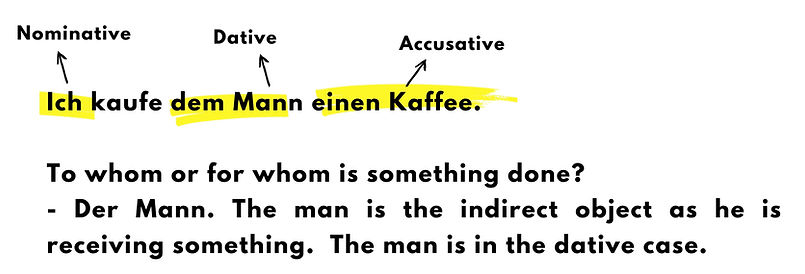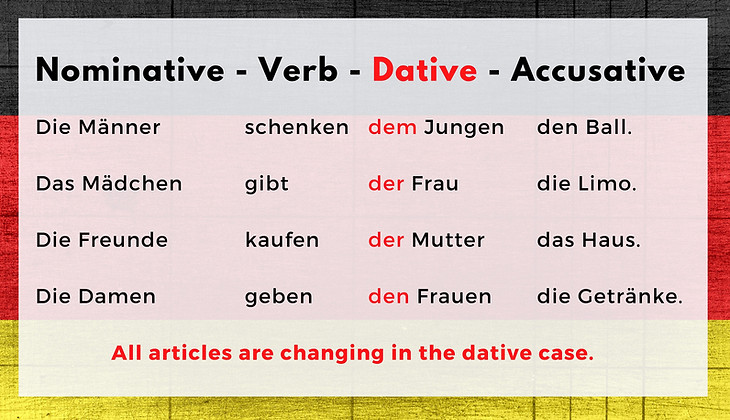What is the Dative case in German grammar and how to use the german Dative case?
The dative is used for the indirect object of a clause. An indirect object is the beneficiary of what is happening in a sentence. All articles change in the dative case. The masculine and neutral articles are "dem", the feminine article is "der", and the plural article becomes "den". The same article endings are also used for the indefinite endings:
"dem" - "einem", "der" - "einer", and "den" - "einen".
To find the indirect object, look for the verb and ask "To whom/for whom is something being done?"
.jpg)
dative articles
All articles are changing in the dative case.
.jpg)
Definite Article
Ich gebe dem Mann ein Buch.
Ich gebe der Frau ein Buch.
Ich gebe dem Kind ein Buch.
Ich gebe den Kindern ein Buch.
Indefinite Article
Ich gebe einem Mann ein Buch.
Ich gebe einer Frau ein Buch.
Ich gebe einem Kind ein Buch.
Ich gebe meinen Kindern ein Buch.

Example sentences to identify the indirect object in a sentence.
Die Eltern kaufen dem Jungen ein Fahrrad. The parents buy a bicycle for the boy.
To whom or for whom is something done?
- The boy. The boy is the beneficiary of what happens in the sentence and is therefore the indirect object in the dative case.
Der Junge gibt der Katze einen Fisch. The boy gives a fish to the cat.
To whom or for whom is something done?
- The cat. The cat is the beneficiary of what happens in the sentence and is therefore the indirect object in the dative case.
Der Junge hilft dem Mädchen. The boy helps the girl.
To whom or for whom is something done?
- The girl. The girl is the beneficiary of what happens in the sentence and is therefore the indirect object in the dative case.
Die Frau gibt dem Kind das Geschenk. The woman gives the gift to the child.
To whom or for whom is something done?
- The child. The child is the beneficiary of what happens in the sentence and is therefore the indirect object in the dative case.
Das Kind gibt den Enten Brot. The child gives bread to the ducks.
To whom or for whom is something done?
- The ducks. The ducks are the beneficiary of what happens in the sentence and are therefore the indirect object in the dative case.
Personal pronouns replace nouns that have already been referred to. In German grammar, personal pronouns are declined according to the case they are in. We use personal pronouns to talk about ourselves and to address other people.
The pronoun must agree in gender and number with the word it replaces.
For example, you could say: Die Frau gibt den Hunden einen Knochen. Die Frau gibt den Hunden auch Wasser. The woman gives the dogs a bone. The woman also gives the dogs water.
But if the noun repeats itself, it would be simpler and more natural to say: Die Frau gibt den Hunden einen Knochen. Die Frau gibt ihnen auch Wasser. The woman gives the dogs a bone. The woman also gives them water.
Dative personal pronouns
.jpg)
When comparing the articles and pronouns, you will quickly see that the endings are always the same. In all cases!
masc.
fem.
neut.
pl.
Dative
articles
dem
der
dem
den (pl.)
Dative
personal pronouns
ihm
ihr
ihm
ihnen
Die Oma erzählt dem Kind eine Geschichte. Die Oma erzählt ihm eine Geschichte. Grandma tells the child a story. Grandma tells him a story.
Hilfst du der Tochter mit der Hausaufgabe? Hilfst du ihr mit der Hausaufgabe? Do you help the daughter with her homework? Do you help her with her homework?
Kannst du dem Kind die Fernbedienung geben? Kannst du ihm die Fernbedienung geben? Can you give the child the remote control? Can you give him the remote control?
Ich backe den Eltern einen Kuchen. Ich backe ihnen einen Kuchen. I'll bake a cake for the parents. I'll bake them a cake.
Important: In English, when the dative case denotes an indirect object, it can and often is rendered with the preposition to or for. Since the dative in German contains the meaning of these prepositions, these prepositions are not required in German to denote the indirect object. A sentence can only have an indirect object if it first has a direct object. By definition, the indirect object is the one to or for whom the subject does something with a direct object.
Dative prepositions
Dative prepositions need to be followed by the dative case:
aus – out of, from
bei – at, amongst, with
mit – with
nach – after; to (country)
seit – since
von – from, of
zu – to, at
gegenüber (von) – opposite
außer – except, apart from
Ich komme gerade aus der Schule. I've just come from school.
Sie wohnt bei ihrer Schwester. She is staying with her sister.
Er fährt mit dem Hund in den Park. He takes the dog to the park.
Nach der Schule mache ich einen Mittagsschlaf. After school I take a nap.
Seit einer Woche lerne ich Deutsch. I have been learning German for a week.
Ich bekam ein Buch von meinem Mann. I got a book from my husband.
Fahren wir zu dir? Shall we go to your place?
Sie wohnt gegenüber von der Schule. She lives across the street from the school.
Hast du außer der Tasche noch etwas gekauft? Did you buy anything else besides the bag?
If you use one of these prepositions, you have to put the noun or pronoun that is following it in the dative case.
In German colloquial language, there are contractions in the use of prepositions with the article "der" and "dem":
zur = zu der, zum = zu dem, beim = bei dem (only with "dem").
Dative verbs
The group of dative verbs is very small, so these verbs should be learnt by heart e.g.: gefallen, geben, gehören, glauben, passieren, schaden, schmecken, vermissen, vertrauen, verletzen. Dative verbs require a dative object.
gefallen
Das gefällt mir gar nicht. I don't like that at all.
danken
Ich danke dem Lehrer. I thank the teacher.
helfen
Er hilft dem Mann. He helps the man.
schmecken
Das Essen in ihrem Lieblingsrestaurant schmeckt ihr gut. She likes the food at her favourite restaurant.
glauben
Sie glaubt ihr nicht. She doesn´t believe her.
geben
Sie gibt ihm den Kaffee. She gives him a coffee.
gehören
Das gehört der Frau. That belongs to the woman.
weh tun
Mir tut der Kopf weh. My head hurts.

